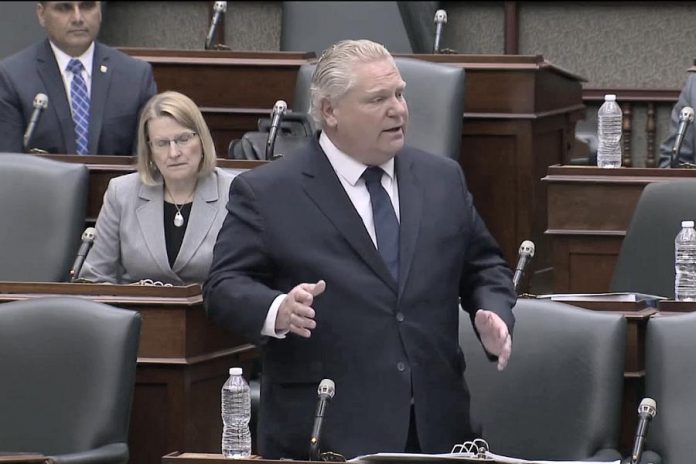
At a special sitting of the Ontario legislature on Tuesday (May 12), MPPs voted to extend the province’s declaration of emergency under the Emergency Management and Civil Protection Act (ECMPA) until Tuesday, June 2nd.
The declaration will allow the Ontario government to continue to enforce existing emergency orders, such as restricting retirement and long-term care home employees from working in more than one facility and prohibiting events and gatherings of more than five people.
“We are making steady progress to flatten the curve and get more people back to work safely, including our legislators, but we still have far to go in defeating COVID-19,” said Premier Doug Ford. “Extending the declaration of emergency will allow us to continue to take action to protect Ontarians, while carefully and cautiously reopening more parts of our economy.”
The provincial government first declared a 14-day state of emergency on Tuesday, March 17th. Under the provisions of the ECMPA, the state of emergency could be extended for one additional 14-day period (until April 14th) with further 28-day period extensions requiring the support of the legislature. On April 14th, the legislature approved an extension of the state of emergency until Tuesday, May 12th.
The Ontario legislature also passed the COVID-19 Response and Reforms to Modernize Ontario Act, 2020, which will help people conduct business while practising physical distancing by:
- providing authority to address in-person attendance rules for school board trustees’ meetings in regulation. This would provide the flexibility in certain emergency situations to allow trustees to meet virtually during school closures.
- enabling corporations to call and hold meetings virtually, as applicable, and extending the time period in which annual meetings must be held in specific circumstances.
- allowing designations of a beneficiary to be provided electronically for Retirement Savings Plans, Retirement Income Funds, Locked-in Retirement Accounts, Life Income Funds and Tax-Free Savings Accounts.
- allowing electronic filing of business registration documents, and the Ministry of Government and Consumer Services to accept copies of business registration documents and e-signatures.
- allowing for regulations to set out the parameters for remotely commissioning or notarizing a document.
- extending, on a one-time basis for 2020, the legislated four-year period during which a Métis Nation of Ontario election is mandated to be held to give more time to support remote voting.
The government also tabled its estimates for the 2020-21 fiscal year, which include $17 billion in program spending to support the province’s response to COVID-19.
List of emergency orders as of May 12, 2020
- Declaration of Emergency
- Extensions and renewals of orders
- Enforcement of orders
- Closure of establishments
- Closure of all outdoor recreational amenities
- Closure of public lands for recreational camping
- Prohibiting events and gatherings of more than five people
- Closure of non-essential businesses
- Prohibiting unfair pricing on necessary goods
- Child care fees
- Off-peak electricity pricing
- Access to COVID-19 status information by specified persons
- Access to personal health information by means of the electronic health record
- Certain persons enabled to issue medical certificates of death
- Hospital credentialing processes
- Treatment of temporary COVID-19 related payments to employees
- Work deployment for boards of health
- Work deployment for health service providers
- Work deployment for long-term care homes
- Work deployment measures in retirement homes
- Limiting work to a single long-term care home
- Limiting work to a single retirement home
- Work deployment measures for mental health and addictions agencies
- Deployment of employees of service provider organizations
- Streamlining requirements for long-term care homes
- Agreements between health service providers and retirement homes
- Temporary health or residential facilities
- Service agencies providing services and supports to adults with developmental disabilities
- Work deployment measures for service agencies providing violence against women residential services and crisis line services
- Work deployment measures for district social services administration boards
- Work deployment measures for municipalities
- Congregate care settings
- Education sector
- Global adjustment for market participants and consumers
- Signatures in wills and powers of attorney
- Pick up and delivery of cannabis
- Drinking water and sewage
- Limitation periods
- Traffic management
- Use of force and firearms in policing services
- Electronic service of documents
- Meetings for corporations


























